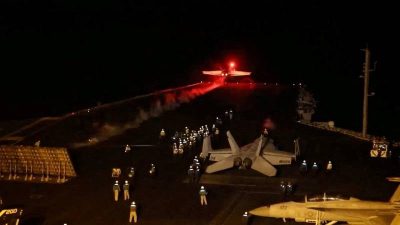‘Only Bad Options’ for US and Allies When It Comes to Dealing with Houthis, Expert Says
US-led strikes 'intended to disrupt and degrade the Houthis' capabilities to endanger mariners and threaten global trade' in Red Sea

All Global Research articles can be read in 51 languages by activating the Translate Website button below the author’s name (only available in desktop version).
To receive Global Research’s Daily Newsletter (selected articles), click here.
Click the share button above to email/forward this article to your friends and colleagues. Follow us on Instagram and Twitter and subscribe to our Telegram Channel. Feel free to repost and share widely Global Research articles.
New Year Donation Drive: Global Research Is Committed to the “Unspoken Truth”
***
The US, UK and other countries have responded to continued attacks by Houthi rebels on Red Sea shipping with a series of strikes across Yemen, but it is not clear whether they will have much of an effect.
“Houthi attacks on Red Sea shipping were a major problem and it was not going to go away on its own,” said Thomas Juneau, assistant professor at the University of Ottawa, whose research focuses on Yemen and Iran.
“The challenge for the US is that they only face bad options in trying to deal with this.”
The US and UK on Thursday struck more than a dozen Houthi targets in Sanaa and along the Red Sea coast, including missile and drone sites as well as radar and surveillance locations.
The military action came after the Houthis launched 27 strikes in recent months on ships in the Red Sea, a critical passageway for global shipping. The group, which is allied with Palestinian militant group Hamas, has claimed the ships it attacked were travelling to or connected with Israel.
This week alone, US forces shot down 18 Houthi missiles and drones aimed at commercial vessels traversing the Red Sea.
Washington has warned both the Houthis and Iran that such attacks would have consequences and President Joe Biden’s patience appears to have run out.
In a statement issued following the strikes, Mr Biden said he would not “hesitate” to take further action if necessary.
But Mr Juneau is doubtful the strikes will deter the Houthis and the US is likely to find that ending the Red Sea attacks for good will be challenging.
The rebel group, which controls much of the western coast of Yemen, has spread its military capabilities throughout the territory it runs, he said.
The Houthis have “significant” weapons at their disposal, including shore-to-sea missiles, amphibious assault teams, drone boats, naval mines and a host of other weaponry.
They have vowed to respond to the strikes, which could drag the US further into a regional conflict it is desperate to avoid.
Washington must find the right balance between striking the Houthis hard enough that their capabilities are affected but not so hard as to draw them deeper into conflict.
“It’s not impossible that they could find that sweet spot of hitting the Houthis just enough to deter them from continuing and not enough that it triggers some kind of escalation,” Mr Juneau said. “But that’s difficult.”
*
Note to readers: Please click the share button above. Follow us on Instagram and Twitter and subscribe to our Telegram Channel. Feel free to repost and share widely Global Research articles.
Featured image: The US and UK struck more than a dozen Houthi targets in Sanaa and along the Red Sea coast, including missile and drone sites as well as radar and surveillance locations. US Central Command / X / Reuters

